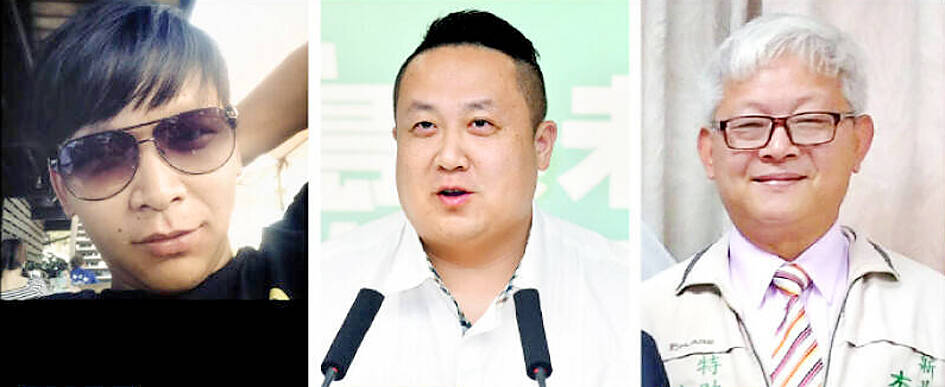Anyone who has worked with a foreign enemy against Taiwan should receive the most severe punishment the state can mete out, the Presidential Office said yesterday, following a report that a Democratic Progressive Party (DPP) staffer’s cellphone contained a Chinese spying app.
The government urgently needs to implement more stringent national security laws and bolster national resilience in light of the Chinese threat against Taiwan, which includes infiltration of the nation and the use of “united front” tactics, it added.
The statement follows a report yesterday by the Chinese-language Mirror Media magazine that prosecutors found a specially developed app used to communicate with Chinese intelligence operatives on the cellphone of former DPP staffer Huang Chu-jung (黃取榮).

Photo: Taipei Times and courtesy of readers
Huang is one of four people, along with former Presidential Office consultant Wu Shang-yu (吳尚雨), former DPP staffer Chiu Shih-yuan (邱世元) and former foreign ministry assistant Ho Jen-chieh (何仁傑), suspected of spying for the Chinese Communist Party (CCP) while working for the government. All four are being detained without visitation rights.
The Taipei District Prosecutors’ Office declined to comment on the report as the case is under investigation.
Mirror Media said that investigators had not previously encountered the app, which they were unable to decrypt, but have determined what information was sent through it.
Huang allegedly used the app to transfer information about President William Lai’s (賴清德) itinerary during his presidential campaign in 2023 and information about Vice President Hsiao Bi-khim (蕭美琴), among other data, it said.
Huang, a former assistant to New Taipei City Councilor Lee Yu-tien (李余典), was allegedly recruited by Chinese intelligence while conducting business in China years ago, and, upon his return to Taiwan, leveraged his knowledge of and connections within the DPP to establish an organization through which he allegedly provided information to the Chinese, prosecutors said.
Wu is suspected of leaking Lai’s itinerary to Chiu, who then gave the information to Huang, they said.
Ho, a former assistant to then-minister of foreign affairs Joseph Wu (吳釗燮), gathered information about the ministry and provided that information to Huang, the Mirror Media report said.
DPP spokesman Justin Wu (吳崢) said the party has stepped up measures to prevent future incidents, including requiring DPP officials to notify the party before they leave the country and to report afterward, increasing officials’ understanding of national security and conducting background checks of all new party members.
Separately, the Mainland Affairs Council said that the CCP has multiple channels to attract and absorb Taiwanese, which are not limited to the Guangzhou-based Jinan University, where Huang studied.
The university, alongside Huaqiao University and Beijing Chinese Language and Culture College, is affiliated with the CCP’s United Front Work Department, and Taiwanese universities are forbidden to interact further with them as of Feb. 20, the council said.
Additional reporting by Chen Cheng-yu and Chen Yu-fu

The Central Weather Administration (CWA) yesterday said it expected to issue a sea warning for Typhoon Fung-Wong tomorrow, which it said would possibly make landfall near central Taiwan. As of 2am yesterday, Fung-Wong was about 1,760km southeast of Oluanpi (鵝鑾鼻), Taiwan’s southernmost point, moving west-northwest at 26kph. It is forecast to reach Luzon in the northern Philippines by tomorrow, the CWA said. After entering the South China Sea, Typhoon Fung-Wong is likely to turn northward toward Taiwan, CWA forecaster Chang Chun-yao (張峻堯) said, adding that it would likely make landfall near central Taiwan. The CWA expects to issue a land

Taiwan’s exports soared to an all-time high of US$61.8 billion last month, surging 49.7 percent from a year earlier, as the global frenzy for artificial intelligence (AI) applications and new consumer electronics powered shipments of high-tech goods, the Ministry of Finance said yesterday. It was the first time exports had exceeded the US$60 billion mark, fueled by the global boom in AI development that has significantly boosted Taiwanese companies across the international supply chain, Department of Statistics Director-General Beatrice Tsai (蔡美娜) told a media briefing. “There is a consensus among major AI players that the upcycle is still in its early stage,”

The Central Weather Administration (CWA) yesterday said it is expected to issue a sea warning for Typhoon Fung-wong this afternoon and a land warning tomorrow. As of 1pm, the storm was about 1,070km southeast of Oluanpi (鵝鑾鼻), Taiwan’s southernmost point, and was moving west-northwest at 28 to 32kph, according to CWA data. The storm had a radius of 250km, with maximum sustained winds of 173kph and gusts reaching 209kph, the CWA added. The storm is forecast to pass near Luzon in the Philippines before entering the South China Sea and potentially turning northward toward Taiwan, the CWA said. CWA forecaster Chang Chun-yao (張峻堯) said

‘SECRETS’: While saying China would not attack during his presidency, Donald Trump declined to say how Washington would respond if Beijing were to take military action US President Donald Trump said that China would not take military action against Taiwan while he is president, as the Chinese leaders “know the consequences.” Trump made the statement during an interview on CBS’ 60 Minutes program that aired on Sunday, a few days after his meeting with Chinese President Xi Jinping (習近平) in South Korea. “He [Xi] has openly said, and his people have openly said at meetings, ‘we would never do anything while President Trump is president,’ because they know the consequences,” Trump said in the interview. However, he repeatedly declined to say exactly how Washington would respond in